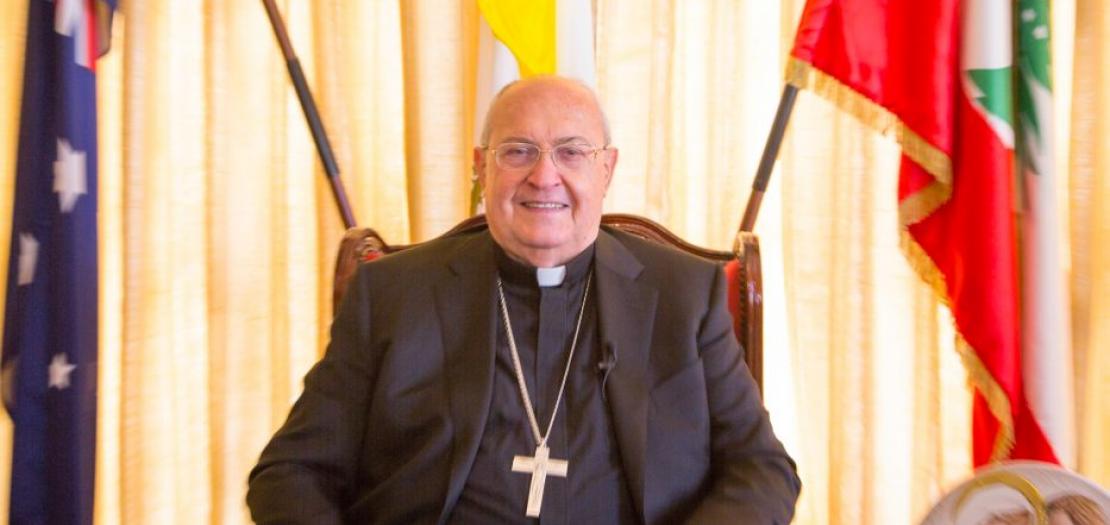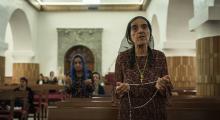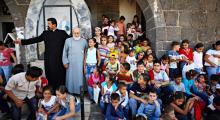Issued by the Catholic Center for Studies and Media - Jordan. Editor-in-chief Fr. Rif'at Bader - موقع أبونا abouna.org

According to Cardinal Leonardo Sandri, who heads the Vatican’s office for Eastern Churches, there’s “great concern” on the part of the Catholic Church regarding the return of Christians to Iraq.
“It will be very difficult for Christians who’ve fled to return if the conditions of safety and access to an education are not guaranteed,” Sandri said on Thursday, December 17.
Speaking about Pope Francis’s upcoming visit to Iraq – planned for March 5-8, 2021 – the Argentine cardinal said that it will have a “global resonance,” and it will serve as a “gesture of solidarity with a Christian community that is still suffering a lot.”
“The pope’s trip is one that wants to bring consolation and hope of a better future for the local church, facing the threats of terrorism and persecution, because the Christian presence in Iraq has virtually been dismantled,” Sandri said. “The visit could bring a message of fraternity and consolation so that the Church can find the strength needed to be a beacon of hope in Iraq.”
Sandri was speaking at a Zoom meeting organized by Stand Together, a project aimed at giving visibility to persecuted Christians around the world, and Rome Reports, a Catholic news outlet.
The prelate also referenced the “scandal of the lack of unity among Christians,” noting that many of those who don’t have faith question why they should “if Christians don’t have the same observance of Christ.”
“When instead, Christians face martyrdom – either Catholics, Coptic or from other denominations – that unity we don’t manifest and is a source of scandal for non-believers, is present in the communion of those who give their lives for Christ,” he said.
The prelate also noted that persecution against Christians is not only found in the Middle East and doesn’t just imply a violent physical threat. In many Western countries, Sandri said, there’s an “environmental aggression” against Catholics, who are banned from publicly expressing their faith in the values of the Gospel and who are called to be silent in respect of the opinion of others.
This ideologically imposed silence, he argued, “does not kill people, but limits their freedom, dignity and respect that we all deserve as children of God.”
The meeting was hacked several times by a user who shared videos and songs with explicit sexual lyrics, which the cardinal said was an example of this attempt to silencing Christians.
Joining the head of the Vatican’s Congregation for the Eastern Churches were Father Luis Montes, an Argentine who has been a missionary in Iraq since 2010, and Maria Lozano, a Spaniard laywoman who coordinates the communications office of the papal charitable agency Aid to the Church in Need (ACN).
Under the theme of “Pope Francis, in the country most punished by ISIS,” the meeting lasted for a little over an hour and took place in Spanish.
Lozano, who’s been to Iraq five times since the rise of ISIS in 2014, gave a wide overview of the situation on the ground, noting that over 300 church properties, including parishes, cathedrals and schools, were destroyed by terrorist in a span of three years.
However, she said, the “long martyrdom, the Way of the Cross” for Christians in Iraq began over a decade earlier, with the fall of President Saddam Hussein.
“When I first visited Iraq in 2014, the local bishops told me that they were writing the ‘final lines in the final paragraphs of Christianity in Iraq’,” she said.
The numbers back up that statement: According to the information she shared, arguably the most reliable data on Christians in the country, there are 150.000 Christians left in a nation that had 1.4 million in 2003.
Yet despite the grim picture painted by statistics, “the local churches made an incredible effort working together to help those who fled their homes with nothing but the PJs they were wearing,” and to then help with the reconstruction of Christian villages destroyed by ISIS.
This effort, which had the support of Christians from around the world that donate to organizations such as ACN and the Knights of Columbus, helped 44 per cent of the families that fled to return to their homes.
Close to 54 percent of the homes had been rebuilt by April, when the COVID-19 pandemic forced the suspension of all activities. The number is significant, taking into consideration that when the papal charity first asked Christian refugees in Erbil, the capital of Kurdistan, and other neighboring countries if they wanted to go back, only 3 percent said they would.
Despite the promising signs, the situation is still “very complex, with a great influence from Iran,” and political instability both in Iraq and the rest of the region, she said. Furthermore, 84 per cent of Christians today living in Iraq argue that their willingness to say depends on their safety, and 70 percent believe the economic situation makes staying very difficult.
“I believe that, thanks to this incredible joint effort, we still haven’t written the final lines of the story of Christianity in Iraq,” Lozano said. “And this visit by the pope is an enormous gift for Christians who’ve been waiting for this visit for over 20 years.”
There had been negotiations for St. John Paul II to become history’s first pope to visit the land of Abraham in 2000, but they fell through.
Montes was speaking from Egypt, where he’ll be for a few months before heading back to Iraq’s capital, Baghdad, hopefully before the pope’s scheduled March 5-8 trip. He too saw the fact that almost 50 per cent of the families who fled after ISIS are back in the Nineveh Plain as a sign of hope, while acknowledging that much needs to change for things to be stable. He said he fact that terrorist attacks have gone from 120 a month to virtually none is an important step.
“But Christians feel the pressure, the insecurity: They’re afraid,” he said. “Iraqi Christians not only want to leave Iraq, but the Middle East, because they don’t trust there won’t be a war in Lebanon a few years from now.”
The fact that the government declared Christmas a national holiday is another step in the right direction following the announcement of the papal visit. Both of these things, Montes argued, “can allow many Muslims, some of whom have never actually met a Christian, to see that we can coexist.”
“Fear is still there, but Christians in Iraq have a very strong faith,” the missionary priest said. “Everyday life in Iraq requires an enormous faith, an enormous trust in God. And we’re called to make every human effort to guarantee that peaceful coexistence that was lost after the war.”







